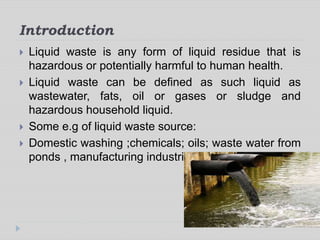Reclaim Waste - The Facts
Wiki Article
Some Known Questions About Reclaim Waste.
Table of ContentsReclaim Waste Fundamentals ExplainedSome Known Incorrect Statements About Reclaim Waste The Ultimate Guide To Reclaim WasteThe Best Strategy To Use For Reclaim WasteLittle Known Questions About Reclaim Waste.
Check out the types, events, and kinds of fluid waste. Residential sewer waste refers to the waste and products from a property sewage-disposal tank. This sort of waste is developed by humans in homes, institutions, and other buildings. This only includes sewage-disposal tanks that have a drain field. The proper administration and disposal of residential sewage waste require fluid waste to be transferred to a sewer therapy plant where the correct methods and equipment are related to purify and dispose of waste.
Commercial waste usually includes potential hazards, such as combustible products or a mixture of fluid and strong waste products, and requires an extra advanced and in-depth disposal procedure. The disposal of commercial waste normally entails the filtration of waste prior to transport to make certain safe and appropriate disposal. Hazardous waste is created from by-products and drainage of industrial processes and manufacturing.
This sort of waste can not utilize the exact same sewage monitoring transport or procedures as septic or business liquids. The hazardous waste management procedure requires the evaluation and testing of liquid waste prior to it goes through the disposal procedure (liquid waste disposal melbourne). Overflow waste is the liquid waste that originates from drainage and excess stormwater in very booming locations or cities
Overflow waste can cause contamination and flooding if not dealt with properly. Guaranteeing proper waste management can stop catastrophes and reduce ecological harm.
Indicators on Reclaim Waste You Need To Know
Contact PROS Providers today to learn concerning our waste monitoring and disposal services and the proper methods to take care of the fluid waste you create.(https://blogfreely.net/reclaimwaste1/yc311a58b1)Do you know what happens to your water when you disengage, flush the toilet or drain the washing equipment? No? Well, it deserves recognizing. This so-called 'wastewater' is not only an important resource yet, after therapy, will be released to our land, rivers or the ocean. Made use of water from toilets, showers, bathrooms, kitchen sinks, washings and industrial procedures is understood as wastewater.

water utilized to cool down machinery or tidy plant and devices). Stormwater, a type of wastewater, is overflow that moves from farming and metropolitan locations such as roofing systems, parks, yards, roads, paths and gutters into stormwater drains pipes, after rainfall. Stormwater streams without treatment straight to regional creeks or rivers, ultimately getting to the sea.
How Reclaim Waste can Save You Time, Stress, and Money.
In Queensland, the majority of wastewater is dealt with at sewer therapy plants. Wastewater is carried from residential or commercial sites through a system of sewers and pump stations, called sewerage reticulation, to a sewer therapy plant. Regional federal governments construct, maintain and run most sewage therapy plants. Operators are licensed under the Environmental Management Act 1994 to discharge treated wastewater at an appropriate environmental standard right into waterways.The Department of Natural Resources advises local governments concerning handling, operating and preserving sewerage systems and treatment plants. In unsewered locations, city governments might need householders to install private or house sewage therapy systems to treat domestic wastewater from bathrooms, kitchens, restrooms and washings. The Department of Natural Resources authorises making use of family systems when they are confirmed to be reliable.
In some brand-new subdivisions, treatment of some stormwater to get rid of trash, sand and crushed rock has started making use of gross pollutant traps. Wastewater therapy happens in four stages: Gets rid of solid matter.
Wastewater then streams right into huge storage tanks where solids settle and are eliminated as sludge. Grease and scum are skimmed from the surface. Utilizes tiny living microorganisms called micro-organisms to damage down and get rid of remaining liquified wastes and fine fragments. Micro-organisms and wastes are included in the sludge. Eliminates nitrogen and phosphorus nutrients that can cause algal flowers in our waterways and endanger marine life.
A Biased View of Reclaim Waste
Nutrient removal is not readily available at all sewer therapy plants since it needs costly specialist equipment. Clear liquid effluent produced after therapy might still consist of disease-causing micro-organisms - liquid waste disposal melbourne.
Most wastewater streams right into the sewage system. Under the Act, regional federal governments carry out approvals and permits for ecologically relevant activities (Periods) including wastewater launches that could have a neighborhood impact.
Some Known Details About Reclaim Waste
Or else, examples are considered research laboratory analysis. Usually many examinations are needed to establish the levels of each of the different contaminants such as oils, hefty steels and chemicals in water. Surveillance supplies valid details about water quality and can validate that licence problems are being met. The details gotten through tracking gives the basis for making water top top article quality choices.Report this wiki page